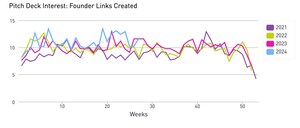SAN FRANCISCO, Feb. 25, 2021 /PRNewswire/ -- DocSend, a leading secure document sharing platform, today released a new report detailing venture capital investors' increasingly high standards of founders raising a pre-seed round. According to the report, pitch deck slides on business models, product readiness and competitive landscape – key indicators of monetization and business viability – are coming under increasing scrutiny. Additionally, VCs became more decisive about sifting through good and bad investments, clocking in record low deck review times for bad bets, and spending more time on the right investments.
The report, The Pre-Seed Round in 2020: New Investor Priorities Emerge, provides a close look at the trends set in motion in 2020 that continue to play out in the first quarter of 2021. The fundraising trends first identified by the DocSend Startup Index in 2020 — record-high investor deck interactions, record-low read times and an increasing supply of startups seeking funding — continue into this year and indicate higher levels of startup scrutiny. While these trends were likely accelerated by the events of 2020 and how the fundraising process shifted dramatically, they will play out in the years to come.
The report is based on a survey of nearly 100 startups that identified themselves as pre-seed as well as VC behavior metrics gathered from the DocSend Startup Index throughout 2020.
Amid Market Uncertainty, Investors Increased Scrutiny
Compared to 2019, VCs in 2020 were much quicker to dismiss pitches that raised red flags such as a poorly defined business model or a lack of a compelling competitive advantage. On average, VCs stopped viewing unsuccessful decks (those that did not receive funding offers) after only 1:36 minutes – less than half the time spent in 2019 (3:30).
When it comes to successful pre-seed pitches, VCs were much more judicious than in years past, spending an average of 4:10 minutes reviewing compared to 3:21 minutes in 2019.
VCs Tracking the Viability Vector
The report identifies three important sections of pre-seed pitches that received the most attention from investors in 2020 — a shift that will likely change the shape of the pre-seed round:
- Competitive Landscape
Investor review of startups' competitive landscape increased by 51% on average. In 2019, the competition section was firmly middle-of-the-pack in terms of time spent by investors with an average of 35 seconds. In 2020, time spent on the competition section went up to an average of 53 seconds in both successful and unsuccessful pitches, signaling a strong interest in market pressures and opportunities.
- Business Model
VCs spent 28% more time on this section in 2020 compared to 2019. This increased focus shows that VCs were interested in much more than a promising product: pre-seed companies needed to show clear plans for monetization.
- Product Readiness
VCs averaged about 46% more time on this section in 2020 versus 2019. This shift suggests that investors prioritized products that were already embedded in thoroughly conceived business models. Only a small minority of startups were not shipping products when they were raising their pre-seed round. Just 11% of companies surveyed lacked a product, and 54% of all companies either had a product in beta or were already launched.
"While the overall amount raised in pre-seed remains relatively small, the standards for success are clearly higher than ever before. Like so many other parts of the business world, the pandemic and events of 2020 have condensed years of gradual evolution into months," said Russ Heddleston, co-founder and CEO of DocSend. "The pre-seed is no longer a place for good product ideas, it's a round that requires executable businesses already in motion."
The Funding Divide Deepens for All-Female Teams
In 2019, DocSend's pre-seed data showed all-female teams raised 30% less than all-male teams at the pre-seed stage — in 2020, the divide unfortunately widened to 60%. All-female teams contacted nearly three times as many VCs than the average team in order to raise less than half of the amount of cash than their all-male counterparts.
Founders Embrace New Zip Codes — With Mixed Results
When it comes to geography, the lion's share of successful pre-seed startups has historically been located in the West, but that is becoming less true. In 2020, every region in the US saw an increase in representation for pre-seed founders. But that didn't necessarily translate to more successful fundraising ventures.
Among US-based startups, companies in the Northeast and West were more successful in 2020 than 2019, whereas the South and Midwest were less successful. This suggests that although pre-seed companies may have moved outside the West Coast, this shift hasn't necessarily been accompanied by an uptick in successful fundraising.
Exacting Investor Behavior Moves Upstream
While nothing is certain, investor expectations about monetization and a company's understanding of its own competitive landscape are unlikely to subside in the years to come. Today's pre-seed founders need to approach the round with the same formality and preparation as they would have the seed stage just a few years ago. For early-stage startups adapting to these new standards, access to the right data can be the difference between landing a deal and coming up short.
"For many founders, the fundraising process can be challenging and opaque. We launched the DocSend Startup Index to offer founders a real-time view of what it takes to successfully fundraise in the modern era," said Alex Poulos, Chief Marketing Officer at DocSend. "Our goal is to take out the guesswork that goes into fundraising and replace it with actionable insights informed by real-world data and trends — improving the process for both founders and investors."
To dive deeper into how pre-seed companies are successfully raising funds, read the full report or join a live discussion with Russ Heddleston on March 2.
About DocSend:
DocSend enables companies to share business-critical documents with ease and get real-time actionable feedback. With DocSend's security and control, startup founders, investors, executives, and business development professionals can build business partnerships that have a lasting impact. Over 16,000 customers of all sizes use DocSend today. Learn more at docsend.com.
Media Contact:
Laura Kubitz
104 West for DocSend
[email protected]
SOURCE DocSend

Related Links
WANT YOUR COMPANY'S NEWS FEATURED ON PRNEWSWIRE.COM?
Newsrooms &
Influencers
Digital Media
Outlets
Journalists
Opted In





Share this article